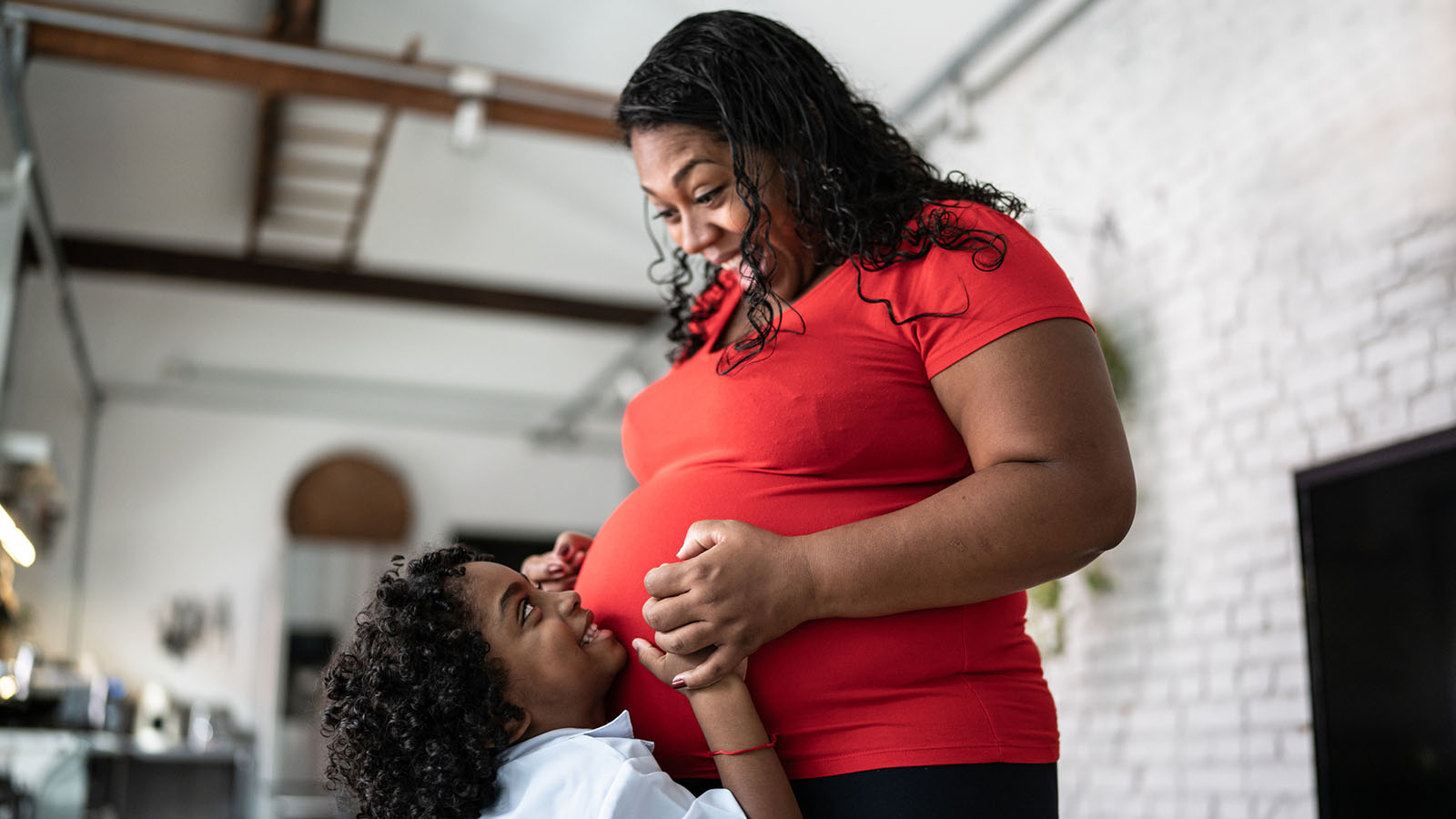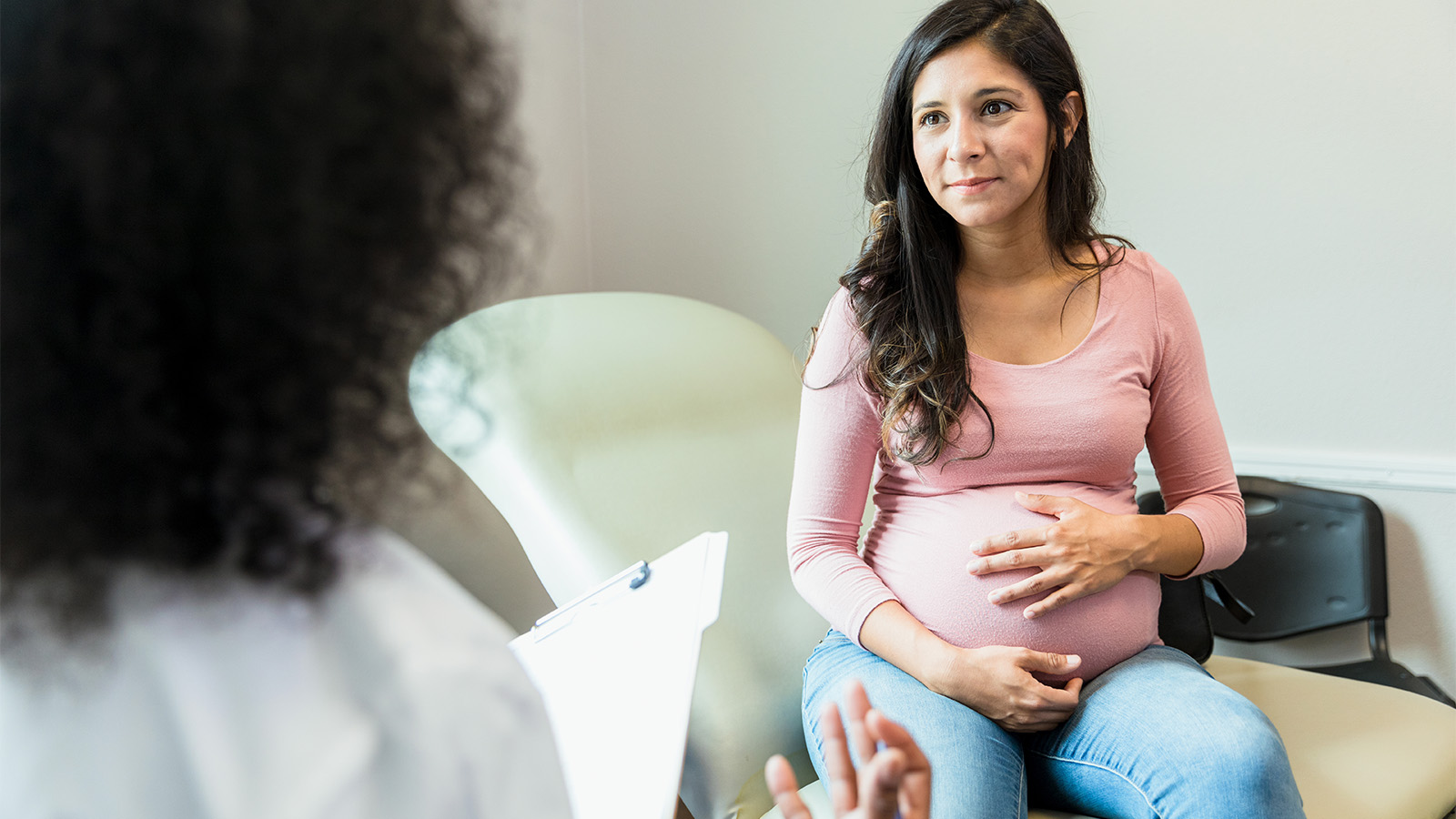How to Have a Healthy Pregnancy if You're Overweight
Discover how to have a healthy and safe pregnancy if you're overweight. Learn about managing weight gain through prenatal care, nutrition, and exercise.

By Olaoluwakitan Ellerson, CNM, Certified Nurse Midwife, Virtua Center for Women
Starting or growing your family is an exciting time—it's natural to want to do everything you can to have a healthy pregnancy. If you're overweight, you might have some extra questions or concerns.
Many women face similar situations. While being overweight can come with a few extra considerations, the good news is that there's a lot you can do to have a wonderful and healthy pregnancy, labor, and delivery.
Being overweight during pregnancy can put you at a slightly higher risk for:
- Gestational diabetes
- High blood pressure (preeclampsia)
- Sleep apnea
- Challenges during birth and delivery
- Pregnancy loss or stillbirth, though rare
Please know this isn't meant to cause worry but rather to empower you with information. The most important thing to remember is that your OB provider is your partner in this journey and can create a personalized plan to help you minimize these risks.
How much weight should you gain during pregnancy?
The following are guidelines for how much weight you should gain during pregnancy based on your current body mass index (BMI):
- Normal weight (BMI 18.5-24.9): 25-35 pounds
- Overweight (BMI 25-29.9): 15-25 pounds
- Obese (BMI 30 or greater): 11-20 pounds
If you’re overweight or obese, here are some helpful steps you can consider to support a healthy pregnancy.
Follow sound prenatal care advice
You should follow basic prenatal care and testing guidelines to ensure a healthy pregnancy. Before trying to conceive, schedule a routine physical exam and begin taking prenatal vitamins with folic acid and DHA.
After pregnancy is confirmed, see your OB provider regularly for prenatal care and screenings, such as ultrasounds for growth and development and blood tests to monitor your and your baby’s health.
Manage weight through healthy eating and exercise
Even losing a small amount of weight (think 10-20 pounds) before you get pregnant can make a remarkable difference. It's a fantastic way to boost your overall health, significantly lower your weight-related risks, and for some, it can even make it a little easier to conceive.
If you’re overweight when you get pregnant, there’s a lot you can do to have a healthy pregnancy, including eating nutritious foods like lean proteins, vegetables, fruits, low-fat dairy, and whole grains. For guidance, schedule an appointment with a Virtua registered dietitian who can help you create a healthy, flexible diet that works for you.
If your doctor says it’s safe to exercise, try walking, lifting light weights, or taking a prenatal yoga class. Staying fit will also help prepare your body for delivery.
Is it safe to lose weight during pregnancy?
Whether you started your pregnancy overweight or have gained more weight than expected, pregnancy is not the time to intentionally try to lose weight. Your body is currently focused on nourishing and building a new life. Every calorie and nutrient you consume directly supports your baby's development. Restricting food can mean your baby isn't getting everything they need.
By focusing on healthy habits and working closely with your health care team, you're setting yourself and your baby up for the best possible start. Your OB provider is always your best resource and partner for discussing all your concerns.
Virtua experts are here to help you have a healthy pregnancy
- Find a Virtua OB provider near you and schedule an appointment online.
- Virtua Health offers a variety of in-person and virtual maternity and breastfeeding classes and interactive courses, including childbirth preparation, baby basics, and more. See all the maternity classes.
There's So Much More to Explore
Discover expert insights, inspiring stories, health tips, and more by exploring the content below!

Understanding Food Addiction: Causes, Symptoms, and Recovery Strategies

The Weird Pregnancy Side Effects No One Tells You About

10 Hand Washing Tips to Keep You Healthy All Year

How the Unique Stages of a Woman's Heart Affect Her Health

Cervical Cancer Screening Guidelines: What You Need to Know

HeartTalk Magazine

How to Spot the Early Signs and Symptoms of a Stroke

How Weight-Loss Surgery Can Improve Diabetes, Heart Health, and More

How to Achieve Your Health Goals This Year

Knee Replacement Rehab: 7 Exercises to Restore Your Strength and Range of Motion

Caregiving During the Holidays: Ways to Manage Stress and Find Joy

Bioidentical Hormone Replacement Therapy Pellets: Relief for Menopause and Andropause Symptoms

Why Is Sex Painful During Pregnancy? Pelvic Congestion Syndrome Explained

COVID-19 Vaccines and Pregnancy: FAQs

COMFORTing Tips to Avoid Holiday Heartburn

How to Tell the Difference Between Cold, Flu, and COVID-19

From Exhaustion to Empowerment: Tracy's Hormone Replacement Therapy Success Story

Daily Wellness Checklist: Simple Habits for Feeling Good Inside and Out

Sexual Health FAQs: The Questions Everyone’s Too Embarrassed to Ask

3 Reasons Why Now's the Time to Find Relief From Varicose Veins

How to Get and Stay Healthy This Fall

How to Reverse Prediabetes and Prevent Type 2 Diabetes

6 Ways to Get More Out of Your Daily Walk

Young Breast-Cancer Survivor Has New Hope for Healthy Future

What To Know About Vaginal Discharge During Pregnancy

Is Cancer Hereditary? What You Need to Know About Your Genetic Risks

Tara's Story: From Debilitating Uterine Fibroid Pain to a Half-Marathon Medal

Is Your Post-Pregnancy Belly Bulge a Sign of Diastasis Recti?

Your Guide to Mammograms: When to Get Screened and What to Know

The Top 10 Foods That Boost Your Brain Health

Is It Safe to Exercise During Pregnancy?

10 Ways First-Time Moms Can Avoid a C-Section Delivery

Prevent Yard Work Injuries: Tips for Mowing, Gardening, and Raking

Healthy Weight Gain During Pregnancy: A Guide for Moms-to-Be

How to Curb Nighttime Snack Cravings

Is Your Daily Walk Making You Really Sore?

IBS and Alcohol: Can You Still Enjoy a Drink?

'Feeling Joy Again': ECT Brain Stimulation Therapy Restores Ashley's Well-Being

Not Just for Wrinkles: Botox Injections Promote Improved Bladder Control

Caring Maternity Team Transforms Harley's Pregnancy Crisis Into Lasting Memories

Robotic Hysterectomy, Trusted Care Help Bobbi Shine Again

Easy, Healthy Lunch Ideas for the Beach

How to Stay Cool and Prevent Heat Illness All Summer Long

Do Not Get Burned by These Sunscreen Myths

Beat the Bugs and Save Your Summer

How to Have a Healthy Pregnancy if You're Overweight

Why You Get Sick on Vacation (and How to Stay Healthy While Traveling)

6 Hot Tips for a Safer Summer

4 Surprising Health Truths You Should Know

5 Interesting Facts About Your Heart

Is Low Sex Drive Normal? Revealing the Complex Causes of Low Libido in Women

CABG Surgery: What Women Should Know About Heart Health and Healing

5 Feel-Good Activities to Explore Around South Jersey

Stress Incontinence vs. Urge Incontinence: What's the Difference?

3 Changes You Can Make Today to Lower Your Cancer Risk

A Lung Cancer Screening Could Save Your Life

Take Pride in our Health: Must Dos for LGBTQ+ Preventative Care

4 Foolproof Pelvic Floor Strengthening Exercises for Women

What to Expect During Perimenopause

Protect Yourself From Tick Bites and Lyme Disease

10 Quick Ways to De-Stress

4 Ways to Stay Fit and Healthy on a Budget

Do You Know the Signs and Symptoms of Uterine Fibroids?

How Are Uterine Fibroids Treated?

Can I Have Sex After a Hysterectomy?

From Restless to Restful: How Movement Improves Sleep

5 Simple Ways to Spring Clean Your Wellness Routine

What to Expect From a Robotic Hysterectomy

When You Need A Hysterectomy Know Your Options

Take Control of Incontinence, Prolapse, and Other Pelvic Floor Disorders

How Can I Prevent Bone Loss and Osteoporosis?

The Truth About Menopause, Weight Gain, and Belly Fat

Shedding Light on Lesser-Known Menopause Symptoms and Solutions

Debunking The Myths About Vaginal Dryness

Best Foods for Kidney Health

5 Essential Winter Foot Care Tips When You Have Diabetes

Advanced Minimally Invasive GYN Surgery Puts You at the Center of Care

Your 10-Point Plan to Avoid Winter Weight Gain

Colitis Symptoms Under Control, Jennifer Is ‘Living My Best Life’

Surprising Symptoms May Signal Stroke In Women

8 Key Steps to Better Blood Pressure Control

5 Back Stretches for the Work-From-Home Workweek

The HPV Vaccine: A Powerful Shield Against Cervical Cancer

How Does Breast Density Affect Your Mammogram?

Menopause: New Insights Into the Power of Hormone Replacement Therapy

How to Prevent and Treat Urinary Tract Infections

One New Heart Valve Saves Two Lives in the Tritten Family

6 Numbers Key to Keeping Your Heart Healthy

4 Easy Ways to Treat and Prevent Runner's Knee

Breast Cancer Diagnosis Inspires Catherine to Help Others

Five Mindfulness Tips That Can Help Heal Your Heart
Working from Home? Take a Quick Break to Stretch Your Wrists

Love Your Heart: Essential Care Tips for Every Stage of Life

How Do I Measure My Blood Pressure at Home?

How Do I Improve My Cholesterol Levels?

3 Ways to Reduce Your Stroke Risk

Sarah Wins Back Her Health After Crohn's Disease Diagnosis

A Breast Self-Exam Saved Kristen's Life

How Sex Keeps You Healthy as You Age

Protect Your Child From HPV and Related Cancers

Why IUDs Might Be The Most Effective Birth Control

5 Things You're Too Embarrassed to Tell Your OBGYN

